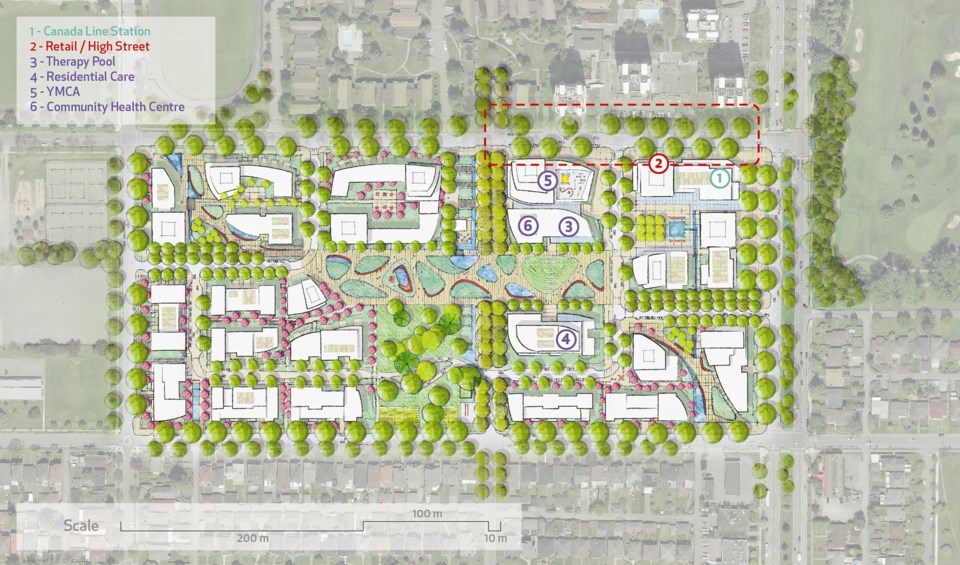Concerns about “institutionalizing” people with disabilities dominated public feedback at city council Wednesday regarding the draft Pearson Dogwood Policy Statement, which is meant to guide redevelopment of the property.
The 25-acre Pearson-Dogwood site is located at West 59th Avenue between Heather and Cambie streets.
Two health care facilities are on the property. The George Pearson Centre has 120 beds for adults living with conditions including multiple sclerosis, spinal cord injuries and traumatic brain injuries. It has 114 residents.
Dogwood Lodge has 113 beds for seniors who need complex care and require 24-hour nursing care.
Vancouver Coastal Health owns 20 acres of the property, while the provincial government owns five acres (Dogwood Lodge.)
If council approves the policy statement, VCH can file a rezoning application.
VCH wants to leverage the site’s land value and reinvest money in health care. It envisions a mixed-use development, featuring healthcare housing and related services, housing, community amenities and park space. The vision includes a 150-bed complex care centre to replace George Pearson Centre and Dogwood Lodge.
The centre would house Dogwood Lodge’s 113 beds, along with 37 of the George Pearson beds. (The remaining 83 would be become independent living units.)
What happens with the 37 George Pearson beds is the main source of contention.
They would be organized along the lines of a “greenhouse model,” according to VCH. Residents have private rooms and baths in a greenhouse model, and can move freely. The concept is based on reversing the idea of enforced dependency.
Critics of the draft policy statement, such as Jill Weiss, chair of the city’s Persons with Disabilities Advisory Group, argue the complex care centre represents an institutional environment.
Weiss said people with disabilities have the right to live in the community — not in institutions. She called the proposal “ethically wrong.”
“This proposal is not acceptable because it includes institutions … do not approve a residential institution that in 10 or 20 years, you will have to apologize for,” she told council.
Speaker after speaker, many with disabilities of various types, said institutionalization contravenes the UN Convention on the Rights of People’s with Disabilities and that it leads to rapid mental and physical deterioration.
“Institutions are factories that turn people into furniture — it’s called a bed,” said one.
“Institutions should be relics of history,” added another. “The City of Vancouver should use all powers granted to it to reject institutionalization. Remember, we are all temporarily able-bodied. We could all find ourselves in one of those beds.”
Speakers described institutionalization as being forced to live with people you don’t know in order to get help, and losing control over one’s autonomy and basic rights such as when to eat, sleep or have visitors. Those who challenge the rules risk being deemed troublemakers, noted one speaker.
Based on the concerns raised, council deferred its decision on the policy statement until city staff can sort out various issues and concerns with the Ministry of Health.
“The number of people who spoke passionately and articulately about the issue of institutionalization of people with disabilities had, I think, an amazing effect on council and staff. As a result, we’re taking a look at the wording that’s been proposed in the draft [policy statement] to see what we can do, and what Vancouver Coastal Health can do, to strengthen the wording so that it better reflects the comments from the people who spoke,” the city’s manager of planning and development Brian Jackson said Thursday morning.
“To be honest, I’m not that sure they’re that far apart. I know the idea of the greenhouse model, in Jill Weiss’ mind, cannot take place in an institution — and they’re in favour of the greenhouse model. The province and Vancouver Coastal Health have said they support the greenhouse model, but they think it can work in an institutional setting. It’s that narrow kind of gap that we’re trying to bridge in coming up with the revised wording.”
Brad Foster, the real estate consultant for VCH who’s working on the project, said VCH understands it’s a complex issue for council.
“We obviously wanted to see the policy passed yesterday given we’ve been in discussions for about 15 months with lots of different stakeholders and city staff,” he said.
“But we also understand the people with disabilities rightly feel very strongly about their issues. What’s going to happen next is VCH will go back and do some thinking about how that care model they’re concerned with can be revised to bring the two parties closer together.”
noconnor@vancourier.com
twitter.com/naoibh



